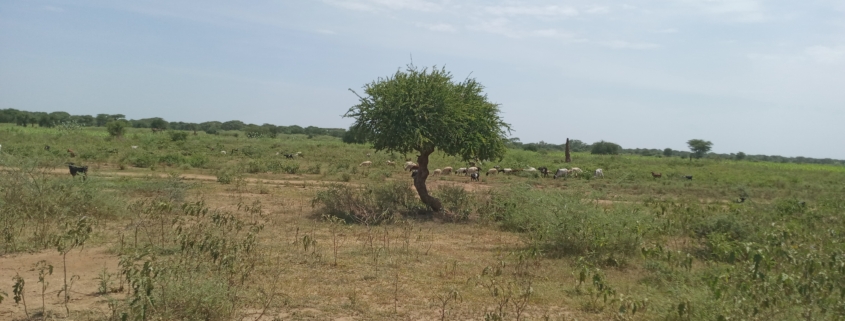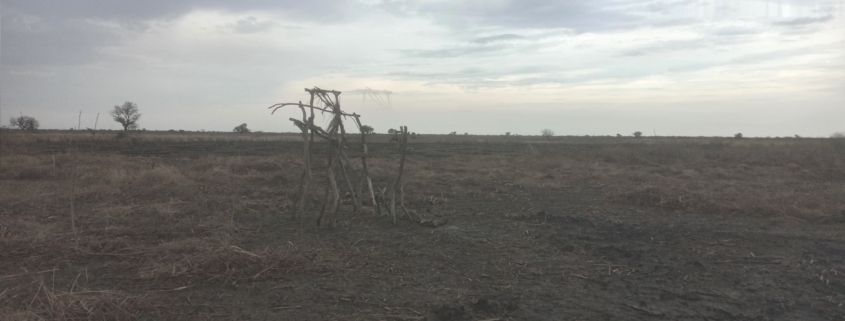This report explores how climate change can intersect with conflict in South Sudan. Using case studies of Kapoeta and the Mangala-Bor corridor, the report finds that climatic events, such as drought and flooding, remain key contributors to migration and violence, including gender-based violence. To mitigate the effects of climate change on conflict, the report provides conflict-sensitive recommendations for aid agencies and donors operating in both drought and flood-hit areas across the country.
About CSRF
The Conflict Sensitivity Resource Facility (CSRF), initiated in 2016, supports the use of conflict sensitivity in donor strategies and programmes in South Sudan.
Entries by CSRF
Kapoeta, a semi-arid area,[1] has been experiencing severe drought conditions since 2021 caused by climate change.[2] The changing conditions have reportedly resulted in the spread of invasive weed species in the last two to three years. These include Beku (local name) with the scientific name Prosopis Juliflora and Abonglogir (local name) with the scientific name Parthenium. Invading farms, grazing land and roadsides, these weeds have a devastating impact on livelihoods, such as farming…
This meta-analysis provides an overview of the literature available on South Sudan’s regional dynamics. Covering the 2011-2023 period, it explores the relations between South Sudan and its neighbors and the related political, economic and security implications. It provides a selection of relevant publications and extracts some of the most salient questions for donor-funding programming on these topics.
This paper presents five lessons on community engagement in the context of the Humanitarian- Development-Peace (HDP) Nexus in South Sudan. More coordinated and collaborative approaches to community engagement have potential to address weaknesses in current approaches that prioritise the short-term information needs of the aid system at the expense of community priorities. The lessons focus on: (1) designing community engagement processes that respond to community priorities, capacities, and preferences, (2) ensuring less fragmented approaches to…
The humanitarian, development, and peace (HDP) nexus as an attempt to enable a more coherent and efficient collective response to dynamic and interconnected crises has received increasing prominence in South Sudan. While there are examples of how an HDP nexus can contribute to more effective aid in conflict-affected contexts, its application also carries conflict sensitivity risks. This analysis piece looks at what a conflict-sensitive HDP nexus might mean in the context of South Sudan. This…
The alleged misuse of spiritual and supernatural powers in South Sudan can lead to youth violence against the accused individuals and their families, as well as their displacement, with related implications for their protection and return to their homes. In this blog, Ranga Gworo explores why this is happening and provides some conflict sensitivity considerations for aid agencies working on protection and return. In September 2021, a young man belonging to a Monyomiji[1] – a…
Wetlands are under threat globally, declining at a rate three times higher than natural forests. This isreason for concern because healthy wetlands offer a variety of essential services to humans and arecritical ecosystems in the fight against climate change.1 Yet, the governance of wetlands often fallsthrough the cracks of water governance approaches and institutions in charge of managing rivers,lakes or aquifers.2 Emblematic of this is the Sudd Wetlands [Sudd] in South Sudan. Little is knownabout…
Some Infos
Lorem ipsum dolor sit amet, consectetuer adipiscing elit. Aenean commodo ligula eget dolor.
Pages
- About Our County Profiles
- Blog
- Case Studies Grid
- Central Equatoria
- Conflict Sensitivity Resource Facility South Sudan
- Contact Us
- Contribute a Repository Article
- County Profile HTML links
- County Profiles
- COVID-19 HUB
- Covid-19 information page
- CSRF About Us
- CSRF Helpdesk
- CSRF Helpdesk Form
- CSRF Login
- Dashboard
- Deliverables
- Demo
- Events
- Forgot password
- Guides, Tools and Checklists
- Helpdesk
- Home
- Latest
- Looker Studio
- Subscribe


